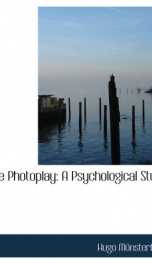Münsterberg Hugo

Hugo Münsterberg (June 1, 1863 – December 19, 1916) was a German-American psychologist. He was one of the pioneers in applied psychology, extending his research and theories to Industrial / Organizational (I/O), legal, medical, clinical, educational and business settings. Münsterberg encountered immense turmoil with the outbreak of the First World War. Torn between his loyalty to America and his homeland, he often defended Germany's actions, attracting criticism. Hugo Münsterberg was born in Danzig (now Gdansk, Poland). His father Moritz was a merchant who bought lumber from Russia and sold it to England. His mother Anna was an artist who continued working while taking care of their four sons. Münsterberg’s first years of school were spent at the Gymnasium of Danzig where he graduated in 1882. He joined the University of Leipzig in 1883 where he met Wilhelm Wundt who influenced him to join the Psychology laboratory. He received a Ph.D. in psychology and in 1887 received his medical degree at Heidelberg. He also passed an examination that enabled him to lecture as a privatdocent at Freiburg. In the same year he married Selma Oppler of Strassburg on August 7. In 1891, he was promoted to assistant professorship and attended the First International Congress of psychology where he met William James. They kept correspondence and in 1892 William invited him to Harvard for a three year term as a chair of the psychology lab. In 1895 he returned to Freiburg due to uncertainties of settling in America. However, in 1897 he returned to Harvard in response to urgent invitation from James and Harvard’s president. In 1898 he was elected President of the American Psychological Association (APA) and in 1910 he was appointed exchange Professor from Harvard to the University of Berlin. He remained at Harvard until his sudden death in 1916 while on a lecture platform. Münsterberg was grounded on the theory of psychophysical parallelism which argued that all physical processes had a parallel brain process. He believed that certain mental ( Neurological ) illnesses have a cellular-metabolic causation and diagnosed based on his behavior-istic observations of the subject's reactions to interviews of them by him . " Psychotherapy " , the book he authored in regard to his investigations in matters of the mind , was published inclusive to 1909 . Hugo Münsterberg wrote several papers on the application of psychological information in legal situations. The main objective in most of these articles was eyewitness testimony which examined the witness. In 1908, he published his controversial book, On the Witness Stand (1908), which talked about psychological factors that can affect a trial’s outcome. Münsterberg was an admirer of Frederick Winslow Taylor. He wrote to him in 1913: “Our aim is to sketch the outlines of a new science, which is to intermediate between the modern laboratory psychology and the problem of economics.” Industrial psychology was to be “independent of economic opinions and debatable . . . interests.”[1] Both Dudley Andrew and James Monaco count Münsterberg's book "The Photoplay: A psychological study" as one of the early examples of film theory.
do you like this author?
What readers are saying
What do you think? Write your own comment on this book!
write a commentWhat readers are saying
What do you think? Write your own comment on this author!
write a commentBook list

The Photoplay
Series:
Unknown
Year:
Unknown
Raiting:
3/5
CONTENTS: INTRODUCTION1. THE OUTER DEVELOPMENT OF THE MOVING PICTURES 3 2. THE INNER DEVELOPMENT OF THE MOVING PICTURES 21 PART I. THE PSYCHOLOGY OF THE PHOTOPLAY 3. DEPTH AND MOVEMENT 44 4. ATTENTION 72 5. MEMORY AND IMAGINATION 92 6. EMOTIONS 112 PART II. THE ESTHETICS OF THE PHOTOPLAY 7. THE PURPOSE OF ART 133 8. THE MEANS OF THE VARIOUS ARTS 155 9. THE MEANS OF THE PHOTOPLAY 170 10. THE DEMANDS OF THE PHOTOPLAY 191 11. THE FUNCTION OF THE PHOTOPLAY 215 It is arbitrary to say where the development of the moving pictures began and it is impossible to foresee where it will lead. What invention marked the beginning? Was it the first device to introduce movement into the pictures on a screen? Or did the development begin with the first photographing of various phases of moving objects? Or did it start with the first presentation of successive pictures at such a speed that the impression of movement resulted? Or was the birthday of the new art when the experimenters for the first time succeeded in projecting such rapidly passing pictures on a wall? If we think of the moving pictures as a source of entertainment and esthetic enjoyment, we may see the germ in that camera obscura which allowed one glass slide to pass before another and thus showed the railway train on one slide moving over the bridge on the other glass plate. They were popular half a century ago. On the other hand if the essential feature of the moving pictures is the combination of various views into one connected impression, we must look back to the days of the phenakistoscope which had scientific interest only; it is more than eighty years since it was invented. In America, which in most recent times has become the classical land of the moving picture production, the history may be said to begin with the days of the Chicago Exposition, 1893, when Edison exhibited his kinetoscope. The visitor dropped his nickel into a slot, the little motor started, and for half a minute he saw through the magnifying glass a girl dancing or some street boys fighting. Less than a quarter of a century later twenty thousand theaters for moving pictures are open daily in the United States and the millions get for their nickel long hours of enjoyment. In Edison's small box into which only one at a time could peep through the hole, nothing but a few trite scenes were exhibited. In those twenty thousand theaters which grew from it all human passions and emotions find their stage, and whatever history reports or science demonstrates or imagination invents comes to life on the screen of the picture palace. Yet this development from Edison's half-minute show to the "Birth of a Nation" did not proceed on American soil. That slot box, after all, had little chance for popular success. The decisive step was taken when pictures of the Edison type were for the first time thrown on a screen and thus made visible to a large audience. That step was taken 1895 in London. The moving picture theater certainly began in England. But there was one source of the stream springing up in America, which long preceded Edison: the photographic efforts of the Englishman Muybridge, who made his experiments in California as early as 1872. His aim was to have photographs of various phases of a continuous movement, for instance of the different positions which a trotting horse is passing through. His purpose was the analysis of the movement into its component parts, not the synthesis of a moving picture from such parts. Yet it is evident that this too was a necessary step which made the later triumphs possible. --This text refers to the Kindle Edition edition.
Show more
add to favoritesadd In favorites
What readers are saying
What do you think? Write your own comment on this author!
write a commentif you like Münsterberg Hugo try:
readers also enjoyed
What readers are saying
What do you think? Write your own comment on this author!
write a commentGenre
if you like Münsterberg Hugo try:
readers also enjoyed
Do you want to exchange books? It’s EASY!
Get registered and find other users who want to give their favourite books to good hands!














